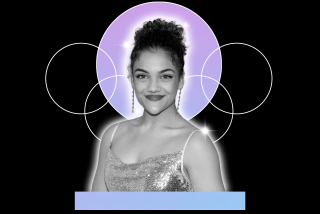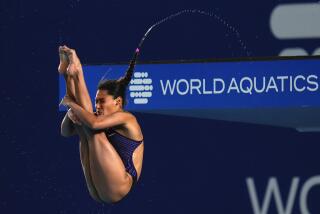Louganis Disclosure Greeted With Sadness : Sports: A day after the revelation that he has AIDS, gays and fellow divers focus on his accomplishments and the impact of his illness.
- Share via
The disclosure that diving great Greg Louganis has AIDS brings inevitable comparisons with basketball superstar Earvin (Magic) Johnson’s 1991 announcement that he was infected with the virus that causes the disease.
But while newscasts have been full of the revelation, the public reaction is so far more muted than it was in Johnson’s case.
“I was here on the Magic Johnson day,” said Lee Klosinski of AIDS Project Los Angeles, which operates Southern California’s major AIDS hot line. “It’s nothing like that. I don’t think anything ever will be.”
Not only does diving have a much lower profile than professional basketball, but Louganis is openly gay, so the vast majority of the public does not see his risk as theirs.
“I don’t think it’s going to have a major impact, which is very sad,” said Nicole Russo of the AIDS Service Center in Pasadena. “And basically it’s because he’s gay. It’s just another opportunity to deny that the disease can affect different communities.”
Considered the greatest competitive diver in the history of the sport, Louganis won four gold medals at the 1984 and 1988 Summer Olympics, after which he retired. He revealed that he has AIDS in a television interview scheduled for broadcast tonight on the ABC show “20/20,” which released a transcript of his comments Wednesday.
Throughout the diving and gay communities Thursday, many lauded Louganis for his achievements while expressing sadness over his condition.
“What an incredible man to have won all of those championships and medals while hiding such a painful secret,” said Cynthia Potter, a former Olympic teammate of Louganis and one of many coaches and divers gathered Thursday at the Rose Bowl Aquatic Center in Pasadena for the Pacific-10 finals. “I think Greg has learned to thrive on that adversity.”
When Louganis publicly discussed his sexual orientation at last year’s Gay Games in New York, the gay community celebrated an openness rare for the sports world. Now, Klosinski lamented, gay men are once again reminded of “the relentlessness of the epidemic.”
“This just contributes to the collective grief that we feel,” Klosinski said. Louganis tested positive for HIV, the virus that causes AIDS, six months before the 1988 Olympic Games in Seoul. But only a few people, including his coach, Ron O’Brien, knew of the test results when Louganis cut his head on a diving board and began bleeding during the games’ preliminary competition.
News accounts this week have focused much attention on the incident, raising questions of pool contamination and whether Louganis had a responsibility at the time to tell Olympic officials that he had HIV.
“Unfortunately what’s getting missed so far is the fact that Greg Louganis showed the world you can be HIV-positive and be the world’s best,” said Daniel Wolfe of Gay Men’s Health Crisis in New York. “That should be the message people take home with them.”
Lorri L. Jean, executive director of the Los Angeles Gay and Lesbian Community Services Center, expressed dismay at the tone of discussion of the pool injury.
“I think that’s just outrageous,” Jean said. “Not only are they blaming the victim, but it is not the responsibility of individual athletes to advise groups like the Olympic Committee or whatever about their HIV status.
“The (committee) should be prepared already,” Jean continued. “Because the truth is . . . there are hundreds of thousands of people who don’t know what their HIV status is who are positive.”
The doctors who treated Louganis for his head cut tested negative for HIV when the U.S. Olympic Committee later learned of Louganis’ condition. And AIDS experts said this week that it is extremely unlikely that the HIV virus could be transmitted through chlorinated pool water.
Concern about that has prompted calls to AIDS agencies. Russo said her education department has had to reassure parents of swimmers, as well as people wondering about risks in the Jacuzzi, that they are not in danger.
Louganis, who is half Samoan, visited the South Bay Samoan community shortly after winning the gold medal in 1984. “There was so much pride that a son of Samoa was in the world limelight,” recalled June Pouesi, deputy director of the Carson-based National Office of Samoan Affairs.
This week, she added, there was a sense of sadness, and hope that Louganis “could find comfort that he had made his mark and had contributed to a better world.”
Stanford diving coach Rick Schavone said that when Louganis’ companion died, “it floated through the grapevine that Greg had tested negative. So this news is definitely a tragedy and goes beyond diving.”
Calling Louganis “the greatest diver there ever was and ever will be,” UC Berkeley diving coach Phil Tonne concluded, “we wish him well.”
More to Read
Go beyond the scoreboard
Get the latest on L.A.'s teams in the daily Sports Report newsletter.
You may occasionally receive promotional content from the Los Angeles Times.











